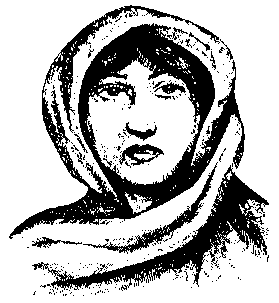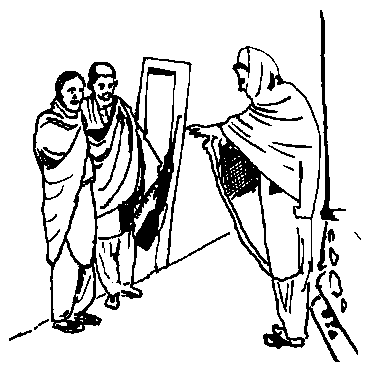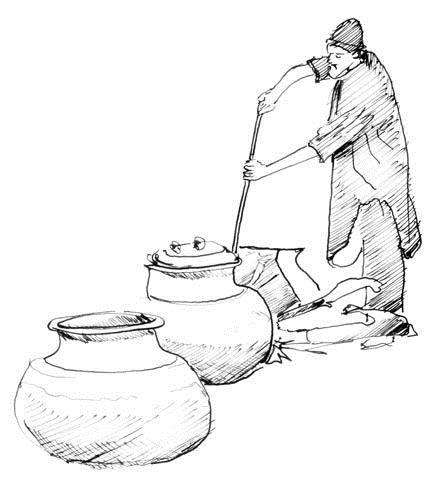Lesson Twenty-Three
Dialogue twenty-three: Ladies’ home-life
L: staa jzwund tsunga terégee? How is your life going? | ستا ژوند څنګه تېرېږى؟ |
H: du aallaa fazul day. By God's grace. | د الله فضل دے. |
L: waadu de pu khpula khwakha kuRay day? Was your wedding of your own choosing? | وادۀ دې په خپله خوښه کړے دے؟ |
H: na, du mor plaay pu khwakha me kúRay day. No, I have gone with my parents' choice. | نه، د مور پلار په خوښه مې کړے دے. |
L: khaawúnd dăr-sara khu day? Is your husband good to you? | خاوند درسره ښۀ دے؟ |
H: na, Der treekh day. No, he is very harsh. | نه، ډېر تريخ دے. |
L: wăle Takawee de tsu? Why, does he hit you? | ولې ټکوی دې څۀ؟ |
H: na, Takawée me na kho hăr wakht ghUsa kégee. No, he doesn't hit me, but he is always angry. | نه، ټکوی مې نۀ خو هر وخت غُصه کېږى. |
L: haghá wăle daase kawée? Why is he like that? (Lit. 'Why does he do that?') | هغه ولې داسې کوى؟ |
H: haghá hăr wakht ghwaaRee che zu du sa'ad khyaal óosaatum. He always wants me to take care of Saad. | هغه هر وخت غواړى چې زۀ د سعد خيال وساتم. |
L: kho tu bu tsu óoke, du kor kaaróona hum Der wee. But what can you do, there is also a lot of housework. | خو تۀ به څۀ وکې، د کور کارُونه هم ډېر وى. |

Men’s dialogue: Enmity
L: zu nun daa zda kawum che dUshmanee tsungo pedaa kégee. Today I am learning how feuds start. | زۀ نن دا زده کوم چې دُشمنى څنګه پېدا کېږى. |
H: dUshmanee yaa pu khuzo yaa pu zmúka ya pu dolăt aw yaa pu ghlaa pedaa kegee. Feuds start over women, land, money or theft. | دُشمنى يا په ښځو يا په زمکو يا په دولت او يا په غلا پېدا کېږى. |
L: badlá akhistúl khu kaar day? Is taking revenge a good thing? | بدله اخستل ښۀ کار دے؟ |
H: aw, pu tso haalaato ke khu kaar day. Yes, in some situations it's good. | آو، په څۀ حالاتو کښې ښۀ کار دے. |
L: ku tsok qátal kRay shee, no awál tsok du haghú badál ákhlee? If someone is killed, then who is the first one to take revenge? | کۀ څوک قتل کړے شى، نو اول څوک د هغۀ بدل اخلى؟ |
H: wrooNa aw zaamún ye badál akhlee. Brothers and sons take revenge. | ورُوڼه او زامن يې بدل اخلى. |
L: che dUshmanee yuwa pera shUróo shee, no byaa tsungo khatmeday shee? If once a feud starts, then how can it stopped? | چې دُشمنى يوه پېره شروع شى، نو بيا څنګه ختمېدے شى؟ |
H: haghwee la ba swara aw ya paysee wărkawée. They will give swara or money to them. | هغوى له به سوره او يا پیسې ورکوى. |
L: maa ta du dUshmanúy yuwa qeesa óoka. Tell me a story about a feud. | ما ته د دُشمنۍ يوه قيصه وکه. |
NOTE:
سوره - swara is the tradition in some villages in which a girl of marriageable age is given to the aggrieved party in the hope that her marriage to the enemy will end the enmity.

Pronunciation drill
Practice these tongue twisters:
'used to, would’: The habitual past
The habitual past is used to talk about actions that would happen regularly, or habitually in the past. There are two forms:
| Imperfective Habitual Past | Perfective Habitual Past | |
|---|---|---|
used for | actions that would happen regularly or habitually, with each occurance viewed as ongoing action or an action that was happening over time | actions that would happen regularly or habitually, with each occurance viewed as a single, complete action |
formula | به - ba + progressive past | به - ba + simple past |
example | dostáan ba raatlúl Friends would/used to come (emphasizing the process of coming each time) دوستان به راتلل | dostáan ba ráaghlul Friends would/used to come (with each coming as a complete event - ie. just saying they arrived each time) دوستان به راغلل |
Intransitive verbs in the imperfective habitual past
| bus dălta oodredó? | Did the bus used to stop here? | بس به دلته ودرېدو؟ |
| aw, paroskáal ba dălta oodredó. | Yes, last year it used to stop here. | آو، پروسکال به دلته ودرېدو. |
| taaso ba pu pekhawúr ke osedéy? | Did you used to live in Peshawar? | تاسو به په پېښور کښې اوسېدئ؟ |
| aw, moong ba halta osedóo. | Yes, we used to live there. | آو، مُونږ به هلته اوسېدُو. |
| haghá ba tsu wakht kaar ta raatló? | When did he used to come to work? | هغه به څۀ وخت کار ته راتلو؟ |
| haghá ba wakhtee kaar ta raatló. | He used to come to work early. | هغه به وختى کار ته راتلو. |
| tu ba hamaysha chărta tle? | Where did you always used to go? | تۀ به هميشه چرته تلې؟ |
| zu ba baagh ta tlum. | I used to go to the park. | زۀ به باغ ته تلم. |
NOTE:
The third sentence makes a very good one for substitution drills.
Intransitive stative compounds with کېدل - kedul (to become) in the imperfective habitual past
| DoDúy ba tsu wakht pakhedá? | When did the bread used to be cooked? | ډوډۍ به څۀ وخت پخېده؟ |
| shpug baje ba pakhedá. | It used to be cooked at six o'clock. | شپږ بجې به پخېده. |
| tu ba tsu wakht Úgay kedé? | When did you used to become hungry? | تۀ به څۀ وخت وږے کېدې؟ |
| zu ba maakháam Úgay kedúm. | I used to become hungry in the evening. | زۀ به ماښام وږے کېدم. |
| baaraanóona ba kala shUroo kedúl? | When did it used to start raining? (m.pl.) | بارانونه به کله شروع کېدل؟ |
| pu pashakáal ke ba shUroo kedúl. | It used to rain in Pashakal. | په پشکال کښې به شروع کېدل. |
| khpo ba de khoogeda? | Did your foot used to hurt? | پښه به دې خوږېده؟ |
| aw, khoogeda ba, kho oos Teek da. | Yes, it used to hurt, but now it is fine. | آو، خوږېده به، خو اوس ټيک ده. |
NOTE:
پشکال - pashakáal is the hot and humid time prior to the monsoon. Explore this and other traditional Pukhtun names for the months.
Passive verbs in the imperfective habitual past
The verb کېدل - kedul (to become) is also used in the passive forms of transitive verbs.
| kapRé ba kala weenzule kedé? | When did your clothes used to be washed? | کپړې به کله وينځلې کېدې؟ |
| hăra haftá ba weenzule kedé. | They used to be washed every Saturday. | هره هفته به وينځلې کېدې. |
Transitive verbs in the imperfective habitual past
| taa ba kapRé ganDúle? | Did you used to sew clothes? (f.pl.) | تا به کپړې ګنډلې؟ |
| aw, maa ba ganDúle. | Yes, I used to sew them. | آو، ما به ګنډلې. |
| haghu ba chărta DoDúy khoRá? | Where did he used to eat food? (f.s.) | هغۀ به چرته ډوډۍ خوړه؟ |
| haghú ba hăra wraze dălta khoRá. | He used to eat here every day. | هغۀ به هره ورځ دلته خوړه. |
| taa ba hăra shpa sharáab skul? | Did you used to drink alcohol every night? (m.pl.) | تا به هره شپه شراب څښل؟ |
| aw, maa ba skul kho oos me prékhodul. | Yes, I used to drink it, but now I've stopped it. | آو، ما به څښل خو اوس مې پرېښودل. |
| taa ba rozaana akhbáar we? | Did you used to read the newspaper every day? | تا به روزانه اخبار وې؟ |
| aw, maa ba we. | Yes, I used to read it. | آو، ما به وې. |
| haghú ba te wahúle? | Did he used to beat you? | هغۀ به تۀ وهلې؟ |
| aw, zu ba ye rozaana wahúlum. | Yes, he used to beat me every day. | آو، زۀ به يې روزانه وهلم. |
Transitive dynamic compounds
| taa ba pu qatár ke kaar kawúlo? | Did you used to work in Qatar? | تا به په قطر کښې کار کولو؟ |
| aw, halta ba me kaar kawúlo. | Yes, I used to work there. | آو، هلته به مې کار کولو. |
| taa ba du haghwée madad kawúlo? | Did you used to help them? | تا به د هغوى مدد کولو؟ |
| na, maa ba hets kala du haghwée madad nu kawúlo. | No, I never used to help them. | نه، ما به هېڅ کله د هغوى مدد نۀ کولو. |
| taa ba mékhe saatúle? | Did you used to keep buffaloes? | تا به مېښې ساتلې؟ |
| haghe ba maa sara khabúre kawúle. | She used to talk with me. | هغې به ما سره خبرې کولې. |
| tek kaal ba me du dwee sara Dere Tóqe kawúle. | I used to joke with them a lot last year. | تېر کال به مې د دوئ سره ډېرې ټوقې کولې. |
Transitive stative compounds
| che tu zwaan we taa ba gáaDay sumawúl? | When you were young did you used to fix cars? | چې تۀ ځوان وې تا به ګاډى سمول؟ |
| aw, sumawúl ba me. | Yes, I used to fix them. | آو، سمول به مې. |
| staa nokúr ba payse puTawúle? | Did your servant used to steal money? | ستا نوکر به پیسې پټولې؟ |
| na, haghá du hamayshá na eemaandáar wo. | No, he was always honest. | نه، هغه د هميشه نه ايماندار وو. |
| haghé ba hamayshá doomra khu khoráak tayaarawúlo? | Did she always used to prepare so much good food? | هغې به هميشه دومره ښۀ خوراک تيارولو؟ |
| pu garmúy ke ba de tsu wakht khpul dookáan koolaawúlo aw bandawúlo? | In the summer when did you used to open and close your shop? | په ګرمۍ کښې به دې څۀ وخت خپل دُوکان کولاولو او بندولو؟ |
| maa ba sahár shpug baje koolawúlo aw du shpe lus baje ba me bandawúlo. | I used to open it at six in the morning and close it at ten at night. | ما به سحر شپږ بجې کولاولو او د شپې لس بجې به مې بندولو. |
Telling stories
This is one of the verb forms that is commonly used in story telling. It needs to be practised by telling short stories that are mostly in this tense.
| daadaa me, khUdaay de óobakhkhee, haghé ba we ... | My dad, may God forgive him, used to say ... | دادا مې، خُدائ دې وبخښی، هغۀ به وې ... |
| khuza me, de khUdáay óobakhkhee, haghá ba we ... | My wife, may God forgive her, used to say ... | ښځه مې، دې خُدائ وبخښى، هغه به وې ... |
Remember that in colloquial speech the verb وئیل - wayul (to say) is often shortened to something like وې - we.

Useful time words
| baséer tul Dére paysee gaTée. | Basir always earns a lot of money. | بصير تل ډېرې پیسې ګټى. |
| tu wăle tul haghú sara jang kawe? | Why are you always fighting with him? | تۀ ولې تل هغۀ سره جنګ کوې؟ |
| moong bu Tool Umur pore haghá yaadawóo. | We will be thinking of him our whole lives. | مُونږ به ټول عُمر پورې هغه يادوُو. |
| gUlaalúy hamayshá khoshaala wee. | Gulalay is always happy. | ګُلالۍ هميشه خوشحاله وى. |
| moong aksár sabúq wáayoo. | We usually study. | مُونږ اکثر سبق وايُو. |
| zu haghá hăr zal weenum. | I see him every time. | زۀ هغه هر ځل وينم. |
| haghwee khaar ta Der nu zee. | They don't go to the city very often. | هغوى ښار ته ډېر نۀ ځى. |
| kala kala penT shirT aaghondum. | I sometimes wear western clothes. | کله کله پېنټ شرټ اغوندم. |
| daa kala naa kala maa la raazee. | She sometimes comes to see me. | دا کله نا کله ما له راځى. |
| haghwee Der kum pu kor ke wee. | They are seldom at home. | هغوى ډېر کم په کور کښې وى. |
| Der kum haghá dălta weenum. | I seldom see him here. | ډېر کم هغه دلته وينم. |
| tu hecher zmaa kor ta nu raaze! | You never come to my house! | ته هېچرې زما کور ته نه راځې! |
| zu hech kala du shpe kaar nu kawum. | I never work at night. | زۀ هېڅ کله د شپې کار نۀ کوم. |
Seasons
| pu sparlée ke mosúm tsínga wee? | How is the weather in the spring? | په سپرلى کښې موسم څنګه وى؟ |
| buraabur wee. | It is moderate. | برابر وى. |
| pu jzímee ke waawra warégee? | Does it snow in winter? | په ژمى کښې واؤره ورېږى؟ |
| na, nu warégee. | No, it doesn't snow. | نه، نۀ ورېږى. |
Comprehension drill: Pictures
👆 Collect some photographs of a wide range of local life, or cut out pictures from newspapers and magazines. You can also use the illustrations in Picture It in Dari and Pashto. Choose a photo or picture and talk about it in the following way:
- Have your helper name the objects. For example,
{" "}
| daa wúna da. daa saRáy day. | This is a tree. This is a man. | دا ونه ده. دا سړے دے. |
- The helper points to the objects and you name them.
{" "}
| wúna chărta da? saRáy chărta day? | Where is the tree? Where is the man? | ونه چرته ده؟ سړے چرته دے؟ |
- Use the picture to show simple relationships between objects.
{" "}
| du wúne laande rawáan saRée ta ishaara óoka. | Point to the man walking under the tree. | د ونې لاندې روان سړى ته اِشاره وکه. |
- Make up a story about the picture in different tenses.
When conversation drags in the hujra or guest room, it is helpful to have a small booklet of pictures with you. It turns any helpful person into a language teacher. It will also keep the conversation focused on a topic with which you are familiar.
Memorising moment
matalóona
Exercises for Lesson Twenty-Three
- This week record a short story about a feud, or some other event. Write out what your friend has told you using phonetics or script. Pay special attention to the verb endings. The following phrase may help you get started:
{" "}
| maa ta du dUshmanúy yuwa qeesa óoka! | Tell me a story about a feud! | ما ته د دُشمنۍ يوه قيصه وکه! |
Now look for chances to retell the story.
- Tell a short story that starts like this:
a. There used to be a rich man …
b. He used to graze his sheep on a nearby mountain …
c. He used to eat a lot …
d. She used to be very poor …
e. We used to sell vegetables …
f. She used to attack the villagers …